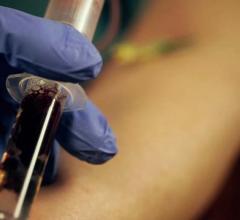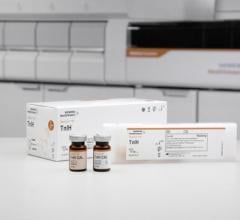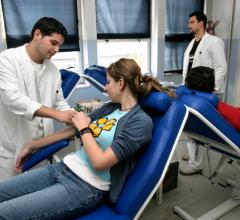March 11, 2015 — Critical Diagnostics announced it has expanded its cardiac biomarker testing product portfolio by CE marking the Aspect-PLUS ST2 test, a rapid quantitative ST2 test. Results are reported in under 30 minutes.
The Aspect-PLUS ST2 test can aid clinicians in assessing risk, making treatment decisions, evaluating therapy effectiveness and monitoring patient care.
The test is ideal for hospital and independent laboratories and is performed by depositing a plasma sample and reagent on a small, single-use Aspect-PLUS cartridge, which is then placed in the shoebox-sized Aspect Reader. The entire analytical phase of the process is automated.
A recently-published European-based study demonstrated ST2 values accurately predict heart failure event risk. Levels of ST2 were measured at presentation to the emergency department and after 48 hours in 207 patients with acute heart failure. In univariate analysis, the percentage change of ST2 over the first 48 hours significantly predicted long-term mortality.
In multivariable analysis, the predictive potential of early ST2 changes persisted after the adjustment for ADHERE risk factors (blood urea nitrogen, systolic blood-pressure and serum creatinine), traditional markers of inflammation (total white cell count and high- sensitive C-reactive protein), BNP, troponin T and percentage BNP changes during the first 48 hours as well as the cumulative diuretic dose administered during the first 48 hours. The study also found that higher risk patients — those whose ST2 didn’t drop by 20 percent or more over the 48-hour window — that received more intensive outpatient care did as well as patients whose ST2 levels did decrease by more than 20 percent, demonstrating that risk can be attenuated.
In another recently published paper, ST2, in conjunction with five clinical variables, was able to predict reverse remodeling. Remodeling refers to the changes in size, shape, structure and physiology of the heart after injury to the myocardium. Understanding the components of this process with the goal of stopping or reversing its progression is often termed 'reverse remodeling.'
In this just over 300-person, multicenter study several biomarkers including Critical Diagnostics’s ST2, NT-proBNP, high-sensitive troponin, both from Roche (OTC:RHHBY), and Galectin-3 (NASDAQ: BGMD), were evaluated to determine if any added to the ability to predict reverse remodeling over clinical variables alone. In a rigorous multivariate analysis, only ST2 survived and was statistically independently associated with reverse remodeling, reclassifying some 15 percent of patients over the clinical model alone. Patients in the study with reverse remodeling had a 3-fold lower incidence of clinical events, defined as cardiovascular death of heart failure hospitalization over the one year follow up.
ST2 is a soluble protein expressed by the heart in response to disease or injury. It is reflective of ventricular remodeling and cardiac fibrosis associated with heart failure.
The Aspect-PLUS ST2 test will be on display at the European Society of Cardiology (ESC) Heart Failure 2015 Congress in Seville, Spain in late May. It is not currently available for sale in the United States.
For more information: www.criticaldiagnostics.com


 October 09, 2019
October 09, 2019 









